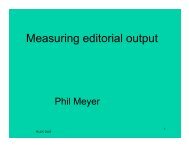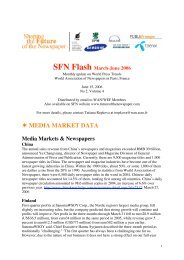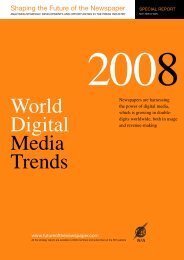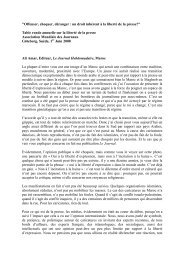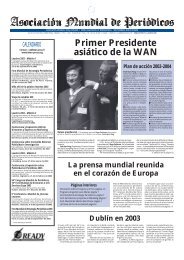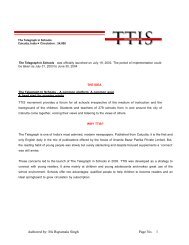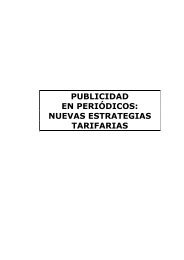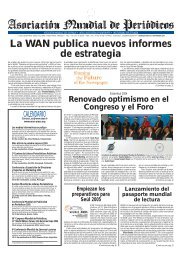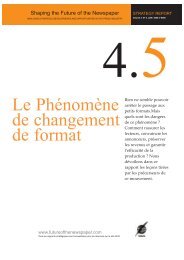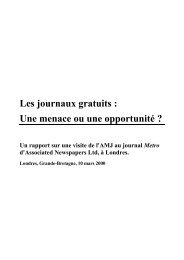WORLD PRESS TRENDS - World Association of Newspapers
WORLD PRESS TRENDS - World Association of Newspapers
WORLD PRESS TRENDS - World Association of Newspapers
You also want an ePaper? Increase the reach of your titles
YUMPU automatically turns print PDFs into web optimized ePapers that Google loves.
GREECE<br />
Research<br />
Readership is measured by: Nielsen Hellas using a sample <strong>of</strong> 7,200<br />
individuals from mainland Greece. The sample represents 80%<br />
<strong>of</strong> the Greek population.<br />
Methodology: Multistage stratified cluster sampling.<br />
Taxes<br />
VAT on: sales 4% advertising 18%<br />
newsprint 18% plant 18%<br />
composition 4% (standard VAT rate 18%)<br />
There is a 20% tax on print advertising. Pr<strong>of</strong>its are taxed at<br />
35%.<br />
There are tax concessions for newspaper companies for<br />
reinvesting pr<strong>of</strong>its under the following conditions:<br />
· The investment has to be accomplished within a 3 year<br />
period<br />
· The company has to invest (during the same period) 30%<br />
more than the pr<strong>of</strong>it reinvested.<br />
Subsidies<br />
Are there subsidies for purchasing newsprint No<br />
Are loans granted at low interest rates for re-equipping or improving<br />
existing equipment Since 1999, subsidies to newspaper<br />
businesses in central urban regions <strong>of</strong> Greece have been stopped.<br />
(Law 2601/98)<br />
There are no direct subsidies for the press apart from cash grants<br />
to small local newspapers. The Ministry <strong>of</strong> Press and Media<br />
decides these grants in camera.<br />
Discounts<br />
on: telegraph 50% telex 50%<br />
These reductions apply on post for newspapers and magazines:<br />
Reduction (%)<br />
Max. weight/copy (grams) National newspapers Regional newspapers<br />
up to 20 80 90<br />
up to 100 78.8 89.4<br />
up to 250 71.7 85.8<br />
up to 500 61 80.5<br />
up to 1,000 53.3 76.7<br />
up to 2,000 25 62.5<br />
Each newspaper is allowed a discount for monthly telephone<br />
charges based on its circulation as follows:<br />
Average monthly circulation<br />
Charge units deducted<br />
110,000-500,000 17,500<br />
500,001-1,200,000 35,000<br />
1,200,001-4,200,000 52,000<br />
4,200,001+ 105,000<br />
Ownership<br />
Does any law exist governing publishing-house ownership, or the<br />
registration <strong>of</strong> shares in newspaper-publishing companies Shares<br />
may only be registered by individuals. Article 40 <strong>of</strong> Law 1806/<br />
88 allows the court to scrutinise the finances <strong>of</strong> press and<br />
broadcast companies. Ownership details must be submitted<br />
annually under pain <strong>of</strong> imprisonment. Article 24 <strong>of</strong> Law 1746/<br />
88 strictly compels registration except for foreign or domestic<br />
investment trusts holding 2.5% or less, state-owned concerns,<br />
and <strong>of</strong>ficial political-party organs.<br />
Is there any law prohibiting or restricting foreign companies or<br />
individuals from owning shares, and in particular, the majority <strong>of</strong><br />
shares, <strong>of</strong> domestic daily newspapers No<br />
Is there any law prohibiting daily newspaper or periodical publishers<br />
from operating radio or television stations in the same locality Law<br />
1866/89 covers privately owned television stations and provides<br />
that:<br />
· Permits may be granted only to joint-stock<br />
companies and local government authorities<br />
(municipalities and communes)<br />
· Joint-stock companies may own no more than one<br />
television permit<br />
· Individual private stakes may not exceed 25%,<br />
including blood relatives to fourth degree <strong>of</strong><br />
kinship<br />
· Non-EU foreign ownership may not exceed 25%<br />
<strong>of</strong> the total share capital<br />
· It is not permitted for the use or operation <strong>of</strong> the<br />
television station to be ceded to individuals or<br />
companies except in the case <strong>of</strong> municipal or intermunicipal<br />
enterprises run by local government<br />
authorities<br />
· Owners <strong>of</strong> television stations may also own either<br />
a radio station or a national newspaper. No<br />
individual or other legal entity may participate in<br />
more than two <strong>of</strong> the three media: newspapers,<br />
television and radio.<br />
So as to guarantee disclosure and transparency in the capital structure<br />
and to avert silent partnerships, is there a law or rule making it possible<br />
to determine who actually owns a publishing company This is<br />
compulsory under Law 1746/88 (‘Transparency in the Press’),<br />
Article 24, with exceptions enumerated above.<br />
Is there an antitrust law limiting concentration in the daily press<br />
Law 2328/95 (‘Concentration’) Article 13 and other regulation<br />
allows common ownership <strong>of</strong>:<br />
· Up to two daily political newspapers, one a<br />
morning and one an evening, published in Athens,<br />
Piraeus, or Thessaloniki and distributed by a Press<br />
Distribution Agency, or by mail, or by its own<br />
means, plus up to two provincial dailies in two<br />
different prefectures<br />
· plus either (a) a single Sunday title covering one<br />
<strong>of</strong> the political titles, or two political titles in one<br />
Sunday edition, or (b) a Saturday or Sunday edition<br />
<strong>of</strong> an independent newspaper distributed by a<br />
Press Distribution Agency.<br />
Are there plans to legislate on media concentration A law enacted<br />
in June 2002 prevents media companies from undertaking public<br />
works and public procurement contracts. This extends to<br />
partners, ‘basic shareholders’, members <strong>of</strong> the board or senior<br />
management <strong>of</strong> such undertakings. ‘Basic shareholders’ are<br />
companies or individuals with more than 5% <strong>of</strong> capital or voting<br />
shares in a media company, those with a larger stake than any<br />
other shareholder, those with voting control in the board, those<br />
exercising majority rights in the latest general assembly, or those<br />
who have entered into a contract with the company with a value<br />
<strong>of</strong> more than 20% <strong>of</strong> that company’s annual turnover.<br />
Moreover, owners, partners, basic shareholders, members <strong>of</strong><br />
the board or senior management <strong>of</strong> media companies cannot<br />
assume the same series <strong>of</strong> functions in companies undertaking<br />
public works or public procurement contracts. The prohibition<br />
also covers family members (unless they can prove financial<br />
independence) or any persons serving as intermediaries. The<br />
definition <strong>of</strong> the public sector that falls under the prohibition is<br />
a wide one.<br />
<strong>WORLD</strong> ASSOCIATION OF NEWSPAPERS - <strong>WORLD</strong> <strong>PRESS</strong> <strong>TRENDS</strong> 2003 131




